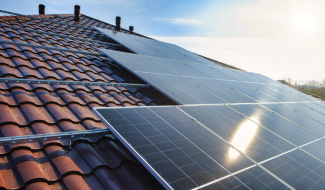Each day, the amount of solar energy that strikes the planet is more than 10,000 times greater than the world's total energy use. The ability to harness that energy makes solar one of the cleanest and most abundant sources of renewable power.
Increasingly, homeowners, businesses, and others are adopting solar technologies to convert this solar energy into useable electricity. In India, solar energy applications reached their official 2022 capacity target of 20 gigawatts four years ahead of schedule.
Now, it’s easier than ever to go solar and reduce your electricity bills by installing solar panels on your rooftop. You might even earn money from the extra power they generate.
The 12 most interesting solar energy facts you probably didn't know
What is a solar rooftop?
A rooftop solar system turns sunlight into electricity using a series of solar panels installed on the roof of a home or commercial building. An inverter or microinverters convert the direct current (DC) power generated by the solar panels to the alternating current (AC) power used in most homes and buildings. There are several different types of rooftop solar systems, with different capabilities and configurations that can offer substantial financial benefits over the years.
Before installing a solar rooftop, there are five factors you should consider.
1) Roof condition
Avoid using a roof that’s leaking, aged, or damaged. Solar panels last up to 25 years on average, so it’s best to get the roof fixed first if it needs repair. The roof should be able to support the panels, and should be stable enough that you don’t have to remove panels for maintenance.
2) Roof size and shape
Your roof must be large enough to accommodate all the solar panels you need, and it should be angled to absorb maximum solar energy. With inadequate sunlight exposure, or not enough panels, you’ll get less from your investment.
Solar Energy 101: How many solar panels are needed to power a house?
3) Environmental factors
Extreme weather, such as hailstorms or hurricane winds, can damage a solar rooftop system. To endure the elements, your system should be professionally installed to make sure it’s strong, sturdy, and built to all applicable standards.
4) Return on investment
Evaluate how much work an installation will require, how much it will cost, and the rates the local electricity authority will pay you for the electricity your system will generate. To ensure you get the best possible return on investment, get accurate estimates from the installers, engineers, or technicians you might choose to work with.
5) Care and maintenance
Solar panels require very little upkeep once installed. But by ensuring that any necessary maintenance is performed, you’ll help your panels generate more electricity while also increasing their lifespan.
Everything you need to know about the care and maintenance of solar panels
Next steps
Doing your homework and carefully considering these five factors before installing a rooftop solar system can help you reap worry-free rewards for many years to come.
To learn more about what Enphase system would be right for you, our easy-to-use System Estimator is the best place to start.


